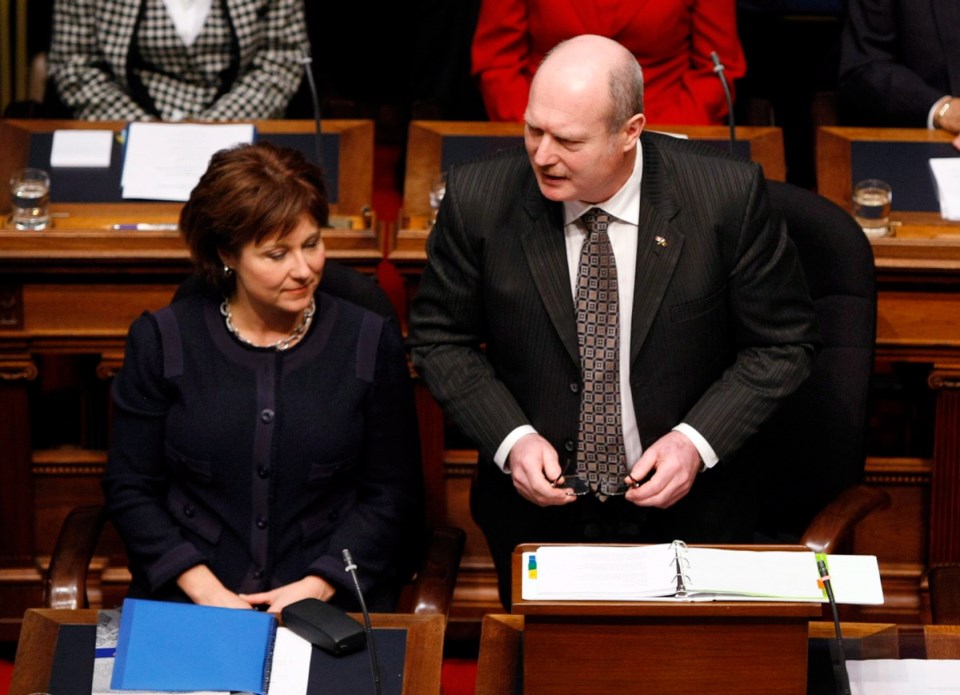THEME DAYS — Premier Christy Clark went into rhetorical overdrive during one question period last week, launching a three-minute defence of her fiscal policies, mixed with a good-natured attack on NDP musings about fighting the tax breaks in the budget.
After touching on Liberal efforts to help people deal with the cost of living, increased migration to B.C., housing starts, business startups, and job numbers, she said it’s all due to “respecting taxpayers, growing our economy, controlling spending and making sure British Columbians have more opportunity to work than ever before.”
The Opposition side grew agitated, but it earned her a round of applause from the Liberal side.
Next up with a question was NDP MLA George Heyman, who brought the house down: “In continuing with this theme, last Thursday, liquid manure on a dairy farm overflowed its sewage lagoon. …”
POETIC LICENCE — Finance Minister Mike de Jong likes a dash of literary flavouring in his budget speeches.
Last year he opened with an extended riff on school report cards, kids walking home excited because it was report-card day, comparing marks, bracing for the reckoning with their parents, and how budgets are like that for governments.
The year before that he sailed the “ship of state” metaphor through a dozen variations — “navigating on free-enterprise-based policy,” “economic seas boiled,” “all hands on deck,” “steady hand on the tiller.”
This year, his introduction was a cross between Jack London’s The Call of the Wild and Stephen King’s The Shining.
He opened by saying the speech was written at the height of the raging snowstorm.
“From my desk on the second floor of my old Matsqui Prairie farmhouse, I watched the blizzard unfold. I watched the snowdrifts grow slowly, imperceptibly at first, until eventually my barn, my garage, and my parents’ house all disappeared behind a 12-foot-high wall of snow.”
The kicker was that finances are like blizzards.
“The combined weight of the deficits and debt can accumulate like a prairie snowdrift and eventually isolate an entire society from the choices it would like to make for its citizens.
“Unlike snowdrifts, budget deficits don’t eventually melt on their own.”
RARE BREED — New Westminster MLA Judy Darcy paid tribute to the late trade union leader Bob White, former president of the Canadian Auto Workers and the Canadian Labour Congress.
Darcy, herself a former national president of the Canadian Union of Public Employees, said White inspired working people.
“I can also attest to the fact that he was, I will say, a rare breed in the trade union movement and in trade union leadership, a man who really supported and encouraged strong women,” she said.
“I say that from experience as the head of Canada’s largest union — the only Canadian female union leader at the time — for the tremendous support that he gave to me, to other women and for building equality and equity within our movement.”
I SEE YOUR BILL … — Victoria-Swan Lake MLA Rob Fleming introduced a private member’s bill designed to improve voter participation in elections.
Fleming wants the province to start pre-registering youth once they turn 16 so that they’re more likely to cast a ballot when they become eligible to vote at 18.
“Under this bill, youth would already be preregistered, and it would encourage young voters to take their civic duty to heart,” he said.
Not to be outdone, B.C. Green Party Leader Andrew Weaver took the concept a step further and introduced a bill that would reduce the voting age to 16.
“There’s a lot of evidence to suggest that the earlier in life a voter casts their first ballot, the more likely they are to develop voting as a habit throughout their life,” he said.
“Austria, Argentina, Brazil, Germany and parts of the U.K. have extended voting rights to 16-year-olds, and it’s time that British Columbia did the same.”
It was an interesting bit of one-upmanship, but neither bill is likely to pass without the Liberal government’s support.



